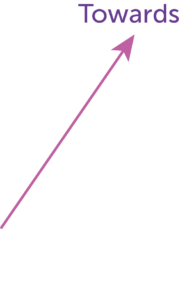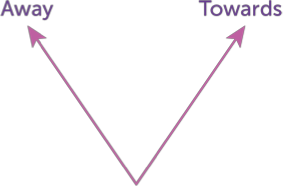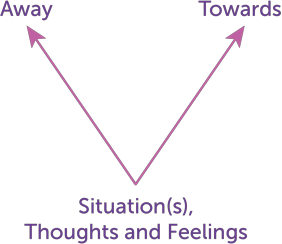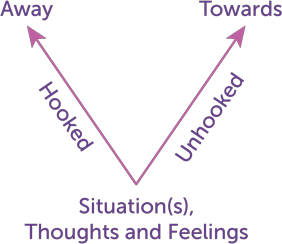from Act Made Simple, Dr Russ Harris
Firstly, values are the things you would choose your life to be about. Values are not what you should do or what others would like you to do, but instead what you choose to do. Values are not rules; they are not goals; it’s not a destination but a direction. Values are within you and guide your actions. They cannot be judged as right or wrong. Values are unique to you; they are global in terms of your behaviour. Most of all, values are not about being happy but living a rich, full, meaningful life.
“What would I be doing differently in my life if I am cancer free?” If my cancer diagnosis didn’t matter, what would I do differently from here on? How would I behave differently with family, friends, colleagues and others? What do I want to stand for in my life right now that gives me a sense of meaning, purpose and vitality?
Write it down.
I wave this magic wand, and all these painful thoughts, feelings and memories no longer have any impact on you. What would you do with your life? What would you start? What would you stop, do more or less of? How would you behave differently? If we watched you on a video, what would we see and hear that would show us that magic happened? Note all these down.
Pain as Your Ally: What does this pain really tell you about what really matters, what you truly care about?
Pain as Your Teacher: How can this pain help you grow or learn or develop new skills and strengths? How can it help you relate better to others?
From Worrying to Caring: What do your fears, worries and anxieties show you that you care about? What do they remind you is very important? Note your thoughts down.
Values can always be lived. Your actions can be guided by your overarching values. Sometimes our goals may be difficult to achieve but you can still get satisfaction by choosing to act in line with your values.
“Before we go any further, I’d like you to imagine something. Imagine that in front of you there’s a free will switch. When the switch is off, you’re here against your free will. You aren’t here for yourself, but only because your partner, employer etc. forced you to come.
So with the free will switch off, being here is a total waste of your time.
However, if you turn the free will switch on, everything changes. The moment that switch goes on, you’re here for you—not for anyone else, but for yourself.
You’re here to use this time for your own benefit, to get something out of it that can make your life better in some way. Remember, the aim is to help you live a better life. So the moment you turn that free will switch on, you’ll have resources at your disposal and we can work together to help you make your life better in some way. And by ‘better,’ I mean better as defined by you—not as defined by your partner, employer etc. And here’s the thing: Whether you turn the switch on or leave it off determines whether being here is a total waste of your time or an opportunity for you to make a positive difference in your life. Of course, no one can force you to turn it on; it’s totally up to you. So, what do you want to do, turn it on or leave it off?”
Earlier you were asked to do some values exercises. You were asked to write your thoughts down. Focus on what matters most to you. Perhaps pick one and use this for the next activity.
Values are enduring, they are not goals that are ticked off the list. Values are never accomplished because they are like points on a compass, no matter how difficult the journey, you will be guided by your values.
What is committed action? It’s active, purposeful engagement and overt behaviour towards your values. If you can, imagine yourself heading towards a specific goal with helpers or goals along the way.
The choice point is like a map that helps keep track what you are doing. Throughout the day, you are busy doing things – drinking coffee, having a shower, texting a friend, listening to music – you are always doing something, even if it is just watching tv and nodding off.
The things you do that take you towards the life you want to live – being the person you want to be, being effective – are called towards moves, because they move you towards your values, towards what matters most to you.

And some things you do that take you away from the life you want to live – being the person you do not want to be, being ineffective – are called away moves, because they move you away from your values, away from what matters most to you.

Now when life is easy, giving you what you want, it’s usually fairly easy for you to choose towards moves; to act effectively, treat yourself and others the way you want to deep in your heart, do the things that make life better in the long term, rather than worse.
But unfortunately, life just isn’t that easy most of the time, and it doesn’t give you what you want for very long. So as you go about your day, all sorts of challenging situations and difficult thoughts and feelings arise.

And unfortunately, you can easily get ‘hooked’ by those difficult thoughts and feelings; they hook you, and they reel you in, and jerk you around, and they pull you off track –and once you’re hooked, you start doing all those ‘away moves’.
However, there are times when you are able to unhook yourself from those difficult thoughts and feelings, and do ‘towards moves’ instead – doing things that move you towards the life you want to live -acting effectively, behaving like the sort of person you want to be. And the better you get at doing this, the better life gets.

So when you’re in these challenging situations, experiencing difficult thoughts and feelings, there’s a choice for you to make: how are you going to respond? Do you unhook and do towards moves? Or do you get hooked and do away moves?
The auto-pilot behaviour when faced with challenging or painful situations is to get hooked, to do away moves. But as one develops unhooking skills (unhooking from thoughts exercise), and you get clear about what matters to you, you find you have a lot more choice about how you respond. It gets easier for you to choose ‘towards arrows’ over ‘away arrows’.
One of the aims is to help you identify your values, what matters to you and who you care about and what sort of person you want to be – and use those values to guide and inspire and motivate you to do more of these towards moves.
The other aim is to develop ‘unhooking skills’, so you can get much better at unhooking from all those difficult thoughts and feelings.
These towards moves also include taking action to solve your problems, and overcome challenges, and change those difficult situations for the better, if and when they can be changed.
The greater your ability to unhook from difficult thoughts and feelings, and choose towards moves, the greater your quality of life, the greater your health, happiness and wellbeing.

Since being diagnosed with CLL, you may sometimes feel your body has let you down. Whether you have just been newly diagnosed, on active surveillance, undergoing treatment, in remission or relapsed, there’s a frustration and impatience you may experience towards your body. You may think it isn’t fair and it shouldn’t be like this. Your self-talk can become a critique of your body.
This meditation is a reminder of the needs of your body for kindness and acceptance. Despite its imperfection, your body is a living breathing system and needs your help to heal itself. This meditation can help change this habit. And when we do, we begin to see—and feel—that these thought patterns are not necessary, and certainly not helpful to our happiness.
